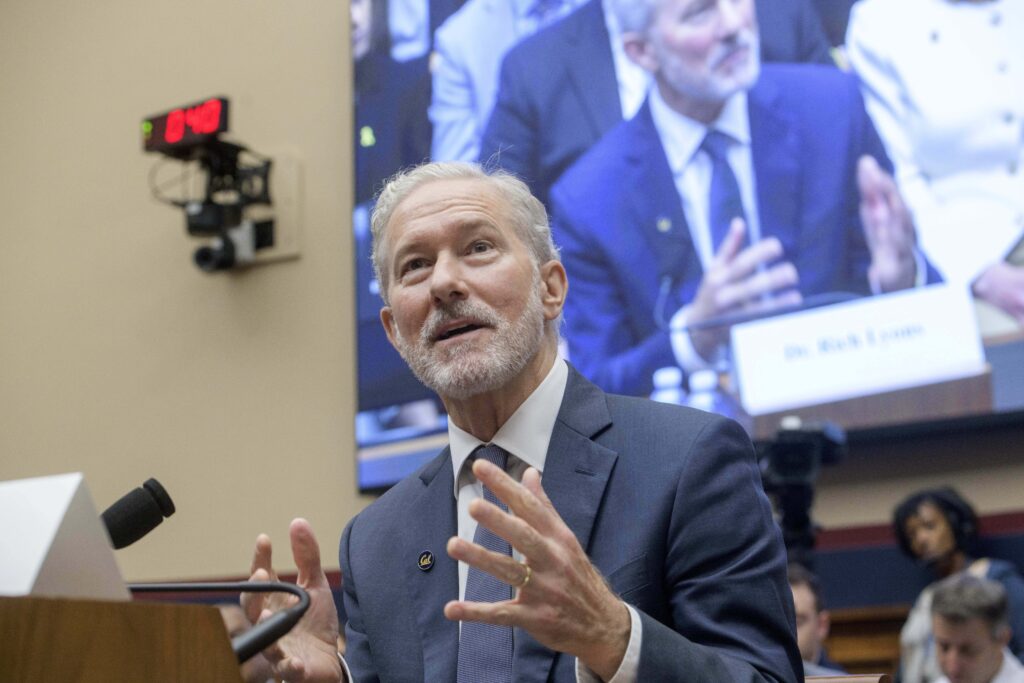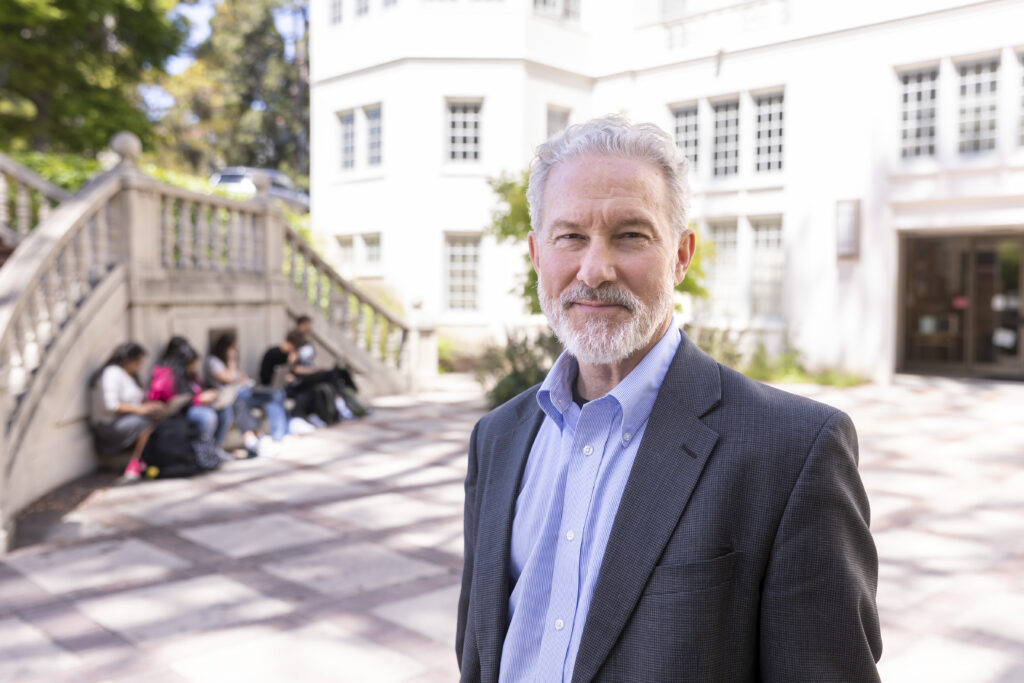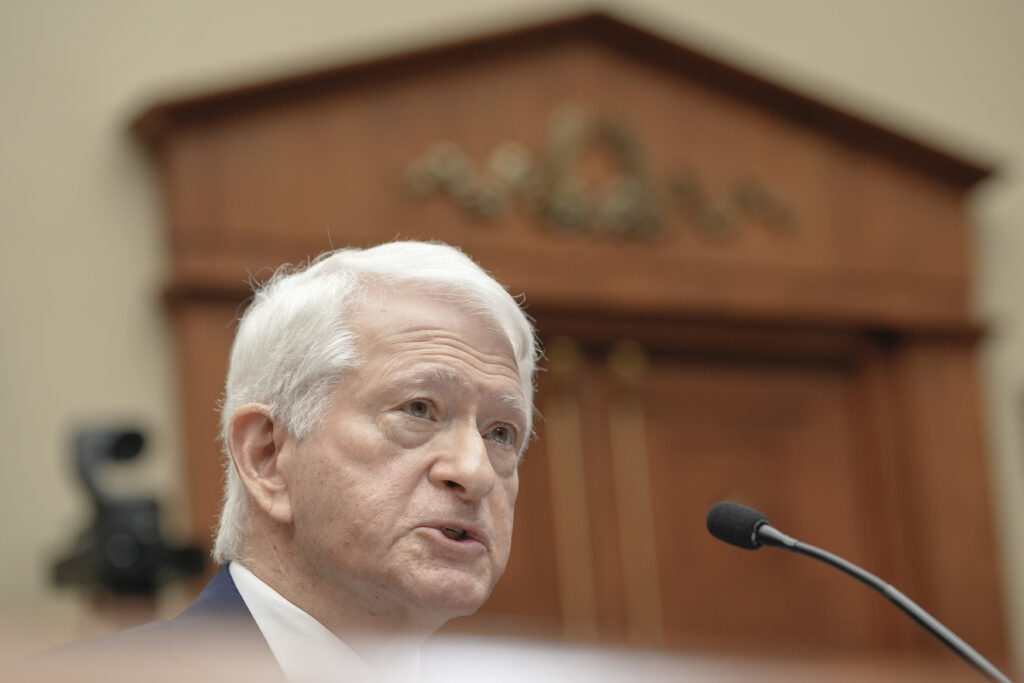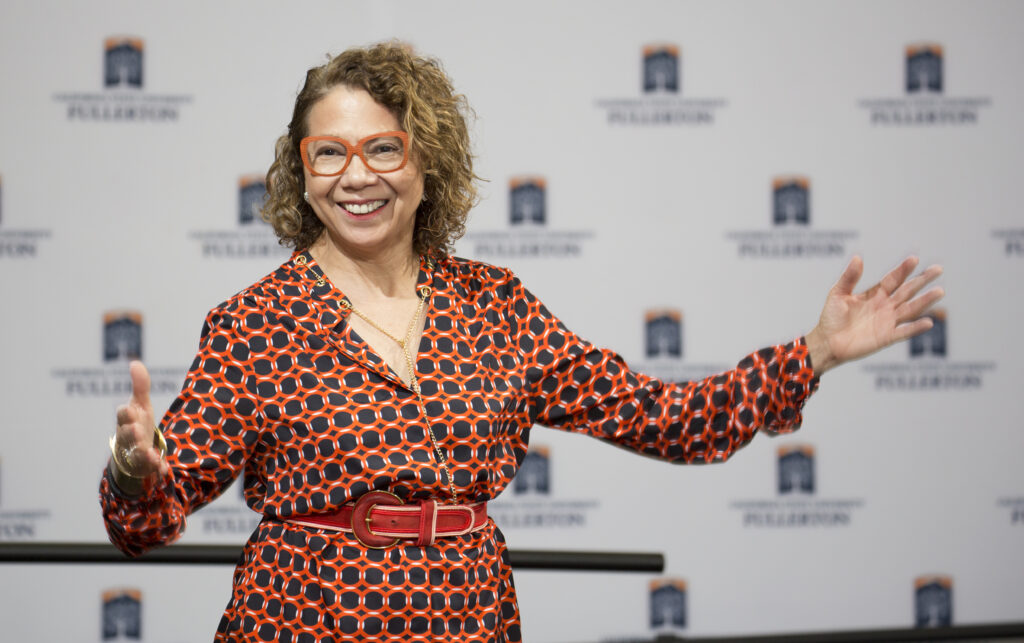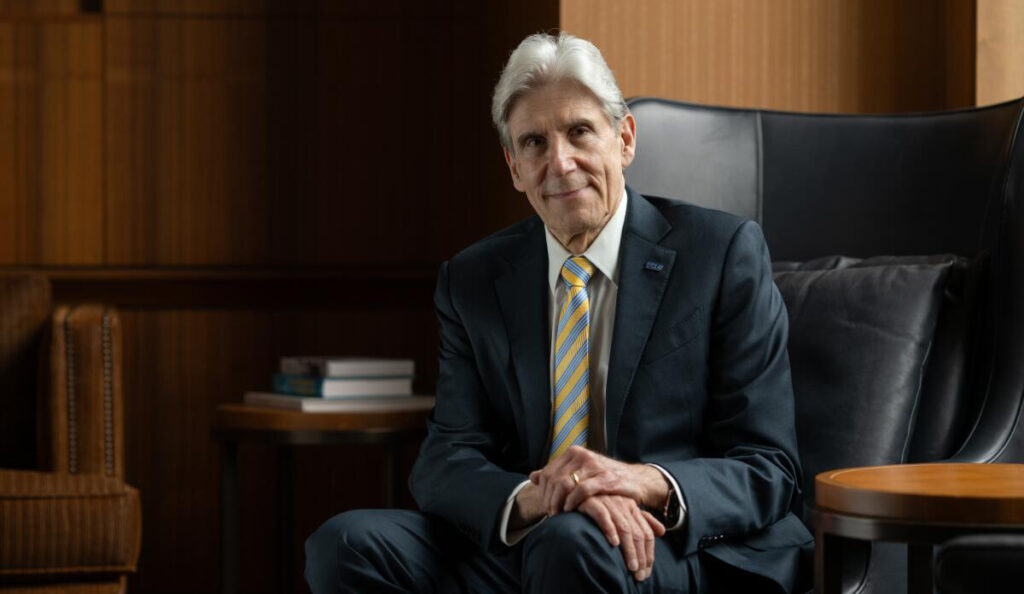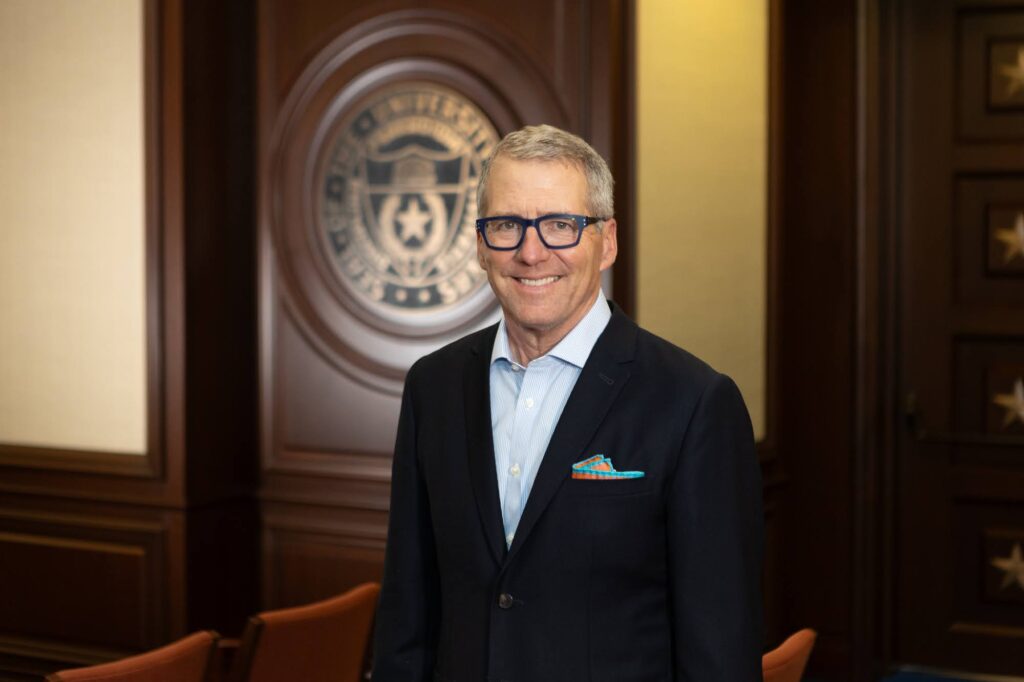
Mildred Garcia, chancellor of the California State University System.
Credit: Cal State Fullerton/Flickr
In October 2023, Mildred Garcia stepped into her role as chancellor for the California State University, becoming the first Latina in the nation to lead a four-year public university system. Formerly the president of the American Association of State Colleges and Universities, Garcia joined the CSU system at a time of post-pandemic turbulence.
Garcia sat down with California Student Journalism Corps reporter Alexcia Negrete in early May for an interview to discuss Garcia’s leadership goals, with student concerns being the primary focus.
The discussion ranged from underrepresented groups having increased access to the CSU system, to Title IX (sex discrimination) issues, to enrollment and tuition challenges.
This interview was edited for clarity and length.
What are the main goals that the CSU, or the main goals that you have to continue supporting students in the next school year?
My North Star is student success, equity, affordability, graduation, retention, everything. The reason I am here is because of the students we serve. We serve the first-generation, the low-income, the students of color, and the adults in the majority in California, with a four-year degree and beyond.
And we are going to be the role model — or we are the role models — on how we graduate students from diverse backgrounds to reach their highest potential. Everything I do is centered on that — how does this affect the students, the families and their goals to reach where they want to be?
And sometimes that goes against people’s perceptions; but this is mine, right? Because I am a first-generation college student. I know how it changes lives. I know we came from a very poor family. And I know how now people that come after me — my nieces and nephews and family members — will say not ‘Will I go to college?’ The question is, ‘What college am I going to go to?’ And so for me, it’s part of my passion, my mission and my life’s work.
You have been president of two Cal State universities, Dominguez Hills and Fullerton, and you have been able to work with students one-on-one during that time. But as a chancellor, that can sometimes feel a little separated. What would you want students to know about you?
I think No. 1 is that I had a similar background that they had. … I grew up in a very poor neighborhood. Then my father died when I was 12, and we had to move to the housing projects of Brooklyn.
I had to work my way to college. We were seven children, and my mother had to support us on a factory salary. … Everybody has a different story, but it’s a story of having the hunger to do better, because we want out of poverty, we want to live a satisfying life (with) economic independence.
I marvel and congratulate each student that is struggling to get that degree and go on and be whatever they want to be — whatever that goal is — and go off and help others and reach their highest potential and be engaged citizens in our communities and cities in California. … It’s not just the college degree, but it’s a path, it’s a chapter in your journey of your book of life.
As a whole, the CSU has faced Title IX scandals, which have led to some students expressing concerns about the overall Title IX process. How will you work to repair the trust lost by the students, and overall, change the image of the process by the CSU?
Well, first of all, we had a huge report by Cozen O’Connor, and also the state auditor, and we are following those steps. Every president has a committee now on how to implement steps, and (they) are supposed to be communicating with their campuses how to really have a voice and have nobody be afraid, with no retaliation on issues of Title IX.
Every campus now is going to have a committee, someone in charge, and we at the Chancellor’s Office are going to monitor that. … Every president of every university in the CSU has a goal (of) reporting to me that Title IX is a priority, and that they are implementing the recommendations of the Cozen O’Connor report, and they will be held accountable for that.
What my hope is, is that each of the campuses is working with their vice president for student affairs, the provost and … human resources, (and explaining) our process. Yes, you can come forward; we will make sure that there is a process, and it’s documented, and that we follow the procedure to do the investigations.
In the CSU, there have been some campuses facing some declining enrollment, and some campuses have been forced to cut classes or faculty members. Are you currently working to ensure that students are still getting the education that they need, regardless of the classes (and faculty) being cut? And if so how?
The answer is yes. Each president is working with their teams to ensure that the students that we have admitted will be able to get the classes and graduate. That is their No. 1 goal.
My No. 1 goal is for the students to have a wonderful experience on their campus and graduate, get the classes and go off and do great things and then come back and tell us about it and become great alumni.
Our No. 1 priority with our team — which is all the presidents and the vice chancellors — is student success. It’s going to be different on each campus, right? So each president has to work with their teams to set up structures and practices, and then hold themselves accountable to watch how students are progressing to graduation.
Before you officially started as chancellor, CSU trustees voted to increase tuition for the next five years. A lot of students have disagreed with the decision and have had protests, saying that the Cal States will now become too expensive for them, or they won’t get enough financial aid support. What kind of reassurance can you provide students who are currently working to pay their tuition and who are concerned about the tuition increase?
First of all, let me go to the data — I don’t have any exact numbers in front of us, but 60% of students have their tuition completely covered. So for the students, it’s not the tuition that’s giving them the problem, it’s the cost of living. What we have to figure out is how do we help and bring together Pell [Grants], State University grants and scholarships to be able to help each of the students really reach the cost of living as much as possible.
While I understand the students — I had to pay my way through college, and I worked three to four, multiple jobs, during the year — our tuition is one of the cheapest in the country. If most of our students are getting their tuition paid, what’s really hurting them is the cost of attendance.
And so we’re trying to figure out ways that we can help the students — that’s No. 1. No. 2, I have been lobbying — even before I came here, at my former job in Washington, D.C. — to double Pell. No. 3, we need to work with our state legislators, who have been good to us, about telling them the need for more resources, for state universities like the California State University system.
The CSU as a whole is anticipating more universitywide budget cuts due to less state aid, and some campuses, because of those cuts, have made cuts to their programs and positions. How will you continue to make sure that students feel supported during this time when we’re getting less state aid?
Each campus has to look at what are core necessities for students so that they can grant what it is that they need the most. Each campus has to look at, ‘What is it that our students need in order to graduate, and how do we do that in a limited budget?’
It’s very much like your budget at home — you have a budget, you’ve got to pay rent, you’ve got to pay your electricity, you’ve got to pay whatever it is that you pay — and you use your paycheck and the fringes have to go. You may not be able to go to dinner three times a week.
It’s the same thing with a university, you take your budget, and you say, ‘What’s our No. 1 priority?’ The No. 1 priority is our students graduating, our students getting their classes, and our students getting the support services they need in order to be doing well in classes and graduate.
Is there anything else that you would like to tell us?
I think that the CSU has to understand they’re a very special place. I worked with 400 institutions across this country when I was in Washington, D.C., and we have to be working together to tell our powerful story saying what the value of the CSU is. Eighty percent of our students stay within a 50-mile radius of where they live after they graduate. That means (they) are the entrepreneurs, the journalists, the people who are going to run businesses, the people who go on to graduate school, the people who become medical doctors. This is what we’re doing for California, this is what we’re doing for the cities.
It’s a private good, I’ll give you that. It helps you and your family for generations to come. But it also helps the city and communities in the state because you pay taxes, you are engaged in your community, you are leaders, you vote, you’re healthier, all of that.
Look, I’m the first one to say nobody’s perfect; we have a lot to do to be better. But we are engaged in such a way that so many of our students are doing great things. … That’s what we need to be talking about. (We need to) continue to do better, improve performance, learn from our mistakes and get better.
Ashley Bolter is a fourth-year journalism major and French and ethnic studies minor at Cal Poly, San Luis Obispo. Alexcia Negrete is a fourth-year communications major at California State University, Fullerton. Both are members of EdSource’s California Student Journalism Corps.

